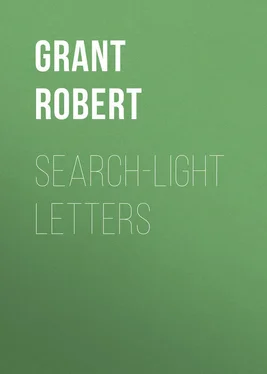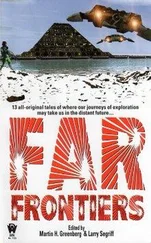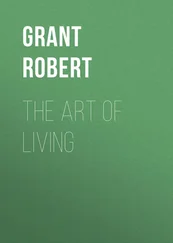Robert Grant - Search-Light Letters
Здесь есть возможность читать онлайн «Robert Grant - Search-Light Letters» — ознакомительный отрывок электронной книги совершенно бесплатно, а после прочтения отрывка купить полную версию. В некоторых случаях можно слушать аудио, скачать через торрент в формате fb2 и присутствует краткое содержание. Жанр: literature_19, foreign_antique, foreign_prose, Юмористическая проза, на английском языке. Описание произведения, (предисловие) а так же отзывы посетителей доступны на портале библиотеки ЛибКат.
- Название:Search-Light Letters
- Автор:
- Жанр:
- Год:неизвестен
- ISBN:нет данных
- Рейтинг книги:3 / 5. Голосов: 1
-
Избранное:Добавить в избранное
- Отзывы:
-
Ваша оценка:
- 60
- 1
- 2
- 3
- 4
- 5
Search-Light Letters: краткое содержание, описание и аннотация
Предлагаем к чтению аннотацию, описание, краткое содержание или предисловие (зависит от того, что написал сам автор книги «Search-Light Letters»). Если вы не нашли необходимую информацию о книге — напишите в комментариях, мы постараемся отыскать её.
Search-Light Letters — читать онлайн ознакомительный отрывок
Ниже представлен текст книги, разбитый по страницам. Система сохранения места последней прочитанной страницы, позволяет с удобством читать онлайн бесплатно книгу «Search-Light Letters», без необходимости каждый раз заново искать на чём Вы остановились. Поставьте закладку, и сможете в любой момент перейти на страницу, на которой закончили чтение.
Интервал:
Закладка:
Did you notice that stout, fashionably dressed man who stopped and looked at me with a grin? He was trying it on, so to speak. He knew just as well as Tom Johnson, the drummer, that he had no right to travel first-class, but he thought I might admit him on the score of social prestige. He is one of the kindest-hearted of fellows – just the man to whom a friend would apply in a tight place, and I rather think he would be apt to help an enemy, unless it happened that something he had eaten for supper the night before had disagreed with him. He has the digestion of an ostrich, and he needs it, for his skin is full of oil, and whiskey, and tortured goose-liver, and canvas-back ducks, and pepper-sauce, and ripe Camembert cheese, and truffles, and Burgundy, and many other rich and kindred delicacies. He could tell four different vintages of champagne apart with his eyes shut, and he has honor at his club on account of it. His name is Howard Vincent. An illustrious-sounding name, isn't it? He inherits gout from both sides of the family. He does not know Tom Johnson, the drummer. They have moved in different social strata. But they belong to the same order of human beings. There! you notice, he asks Tom for a light, and they have begun to talk together. They are laughing now, and Tom is winking. I shouldn't wonder if they were making fun of the first-class passengers. Vincent has read more or less in his day, and he rather prides himself on what he calls keeping abreast of the times in the line of thought. See, they have opened the window, and are beckoning to me. Let us hear what they have to say.
Drummer. Ah, there, philosopher! You wouldn't let us in, and I guess you know your business. We've had a good time in life, anyhow. If the religious folk are right, we shall be in it up to our necks. If they're wrong, they've been wasting a lot of valuable time.
Howard Vincent. We've ridden straight, at all events. (Vincent is an authority on sporting matters.) We haven't pretended to be something we were not. We've never cheated anybody, and we've never lied to anybody, and each, according to his light (this last qualification was for Tom's benefit), has been a gentleman. We've been men of the world, and we have found the world a reasonably satisfactory place. We're in no haste to leave it.
The Philosopher. And may I add, gentlemen, that each of you has a kind and generous heart?
Did you observe how pleased they looked when I said that? It was a little weak of me to say it, but I could not help it. Somehow, it is very difficult to be sufficiently severe to such easy-going, pleasant-natured fellows, who are content to take the world as they find it, laugh and grow fat. Moreover, Tom Johnson has for twenty years supported his old mother and invalid sister, and remained single as a consequence; and Howard Vincent has a habit of giving away delightful sums on Christmas Day without advertising the fact. How often, on the occasion of death, do we hear the aphorism that everything counts for nothing save the kindly deeds of the deceased, until one is tempted to believe that a genial commercial traveller, like our friend, with a benignant soul is more admirable and inspiring than a highly sensitive gentleman and scholar. Indisputably this is so if the gentleman and scholar lacks the humanity for which the other is conspicuous; but, nevertheless, it behooves the soul in search of the ideal to beware of the slough of mere warm-heartedness. It is an attribute which, if relied on too exclusively as a leavening force, is readily made to subserve very ordinary purposes. The two Falstaffian men in the second-class car belong there, even though you might find their kindly ways and their stories attractive up to a certain point. They are of the class of men who, more signally perhaps than any other, bar the path of the world's progress toward the stars by means of the argument that what has been must be, and that what is is good enough. They are of the men who shrug their shoulders when the hope is expressed that the abuse of liquor may be lessened and finally controlled; who sneer at the efforts of the police authorities to shut up all the houses of ill-repute, on the ground that prostitution has always existed and must always exist. (That it will never become "unpopular," as the drummer would tell you in his breezy way.) Assuredly, you need to be on your guard against infatuation with those big, genial and (usually) pot-bellied personages whose large hearts and abundant charity and splendid appetites allow them to discard as unworthy of a sensible man's regard everything but honesty, reading, spelling and arithmetic (add, in the case of Howard Vincent, a dash of accomplishments and agnostic philosophy), Worcestershire sauce and jests of custom-made humor. Blessed be humor. The man or woman without it is like a loaf of stale bread or a cup of brackish water. But to be content with the mere workaday world and its ways is like travelling perpetually with a grip-sack. When we open the grip-sack, what do we find? The barest necessaries of life, without a trace of anything which inspires or refines. I have no desire to betray the private affairs of any commercial traveller, or to imply that the Bible and Shakespeare are not occasionally to be found both in the kit of the travelling man and the English leather trunk of the more elegant man of fashion. I am simply cautioning you, my male correspondents, to beware of accepting as final your world as you find it. Nothing is more sure to make you a second-class person. Mere good-natured common-sense ("horse-sense," as our drummer would call it) is a useful virtue, but it would keep civilization ordinary to the crack of doom.
Ah! now we are likely to have trouble. Notice, please, the lady coming this way. How graceful and elegant she is. A delicate, refined face and bearing. See how she sidles off from the third and second-class passengers with an expression of distaste for them which suggests pain. She cannot bear coarse people. She believes herself to be an intellectual woman with serious tastes. She aims to be a spiritual person and she reads many essays – by Emerson, Matthew Arnold, Pater, and others. She is fond of history and politics; not of this country, because she claims that it is vulgar and lacks picturesqueness. But she can tell you all about the governments of Europe, and who is prime minister of or in authority in each of them. Democracy does not interest her. It seems to her to concern the affairs of dirty or common people; and she cares nothing for the great social questions of the age. They appear to her to clash with personal spirituality and culture. She is very sensitive. She has made a study of music, especially Wagner. She is very particular as to what she has to eat, but the grossness of men, as she calls it, offends her seriously. She believes herself to be not very strong physically, and she is nervous on the subject of arsenic in wall-papers and germs in drinking-water. She has retained her maidenly instincts to the last.
What is that you ask, madam? A seat in a first-class carriage. Excuse me, you cannot go in there. You belong in the second-class section of the train. Mistake? There is no mistake. I understand perfectly. I'm ready to take your word for it that you have read Dante in the original, and I know that you are
Chaste as the icicle
That's curded by the frost from purest snow,
And hangs on Dian's temple.
(Doubtless you recall the quotation.) But you must stay out. Your ticket reads "Personal culture and individual salvation," and it entitles you to ride in any of those second-class cars. You don't like the passengers? I am very sorry, I'm sure, but my instructions are explicit. I was told to keep out all ladies of your kind, who think that the ideal is to be attained by hugging themselves to themselves (excuse the coarseness of the metaphor, madam) all their days in a hot-house atmosphere, and playing bo-peep with their own souls. You intend to write a letter about it to the Boston Evening – ? Oh, very well. You will have to ride second-class, all the same.
Читать дальшеИнтервал:
Закладка:
Похожие книги на «Search-Light Letters»
Представляем Вашему вниманию похожие книги на «Search-Light Letters» списком для выбора. Мы отобрали схожую по названию и смыслу литературу в надежде предоставить читателям больше вариантов отыскать новые, интересные, ещё непрочитанные произведения.
Обсуждение, отзывы о книге «Search-Light Letters» и просто собственные мнения читателей. Оставьте ваши комментарии, напишите, что Вы думаете о произведении, его смысле или главных героях. Укажите что конкретно понравилось, а что нет, и почему Вы так считаете.






![Marcel Proust - In Search of Lost Time [volumes 1 to 7]](/books/579170/marcel-proust-in-search-of-lost-time-volumes-1-to-thumb.webp)





